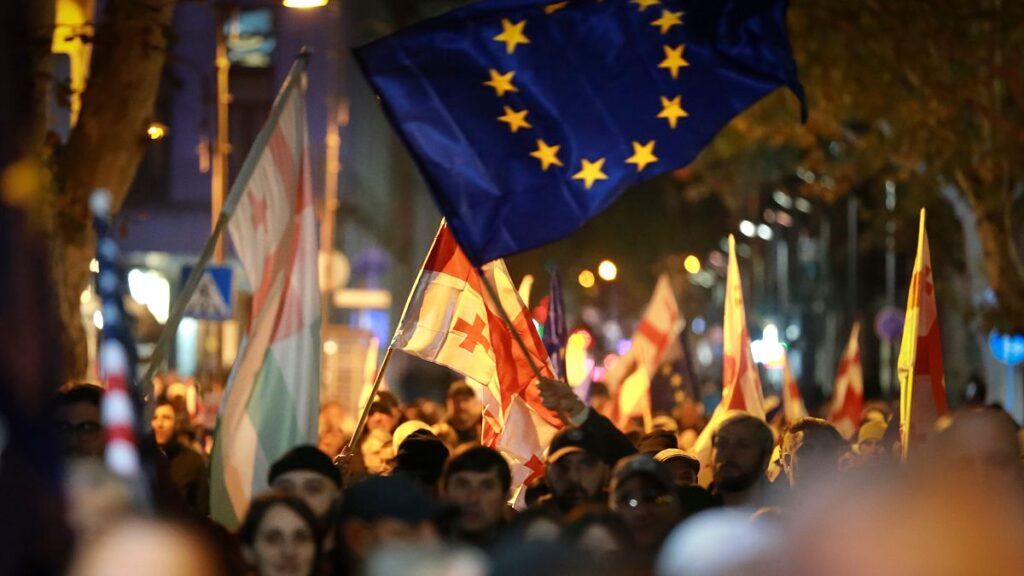Thousands of Georgian opposition supporters rallied in Tbilisi once again, demanding new parliamentary elections under international supervision and an investigation of alleged election fraud.
Thousands of opposition supporters rallied outside Georgia’s parliament for the second straight Monday to denounce the 26 October election as illegitimate.
Georgia’s ruling party, Georgian Dream, was declared the winner amid allegations of vote-rigging helped by Russia.
The protesters, who waved Georgian and European Union flags, demanded a new parliamentary election under international supervision and an investigation of the alleged ballot irregularities.
Opposition leaders vowed to boycott sessions of parliament and hold regular protests until their demands are met.
“We will not accept illegitimate elections; we will not recognise an illegitimate parliament,” said Badri Japaridze, leader of the Lelo Strong Georgia Coalition. “We will not go to that parliament, and we will not let Georgian Dream announce itself as the legitimate representative of the Georgian people, because they have stolen the elections. This is a special operation backed by Russia, where the future of the Georgian people has been stolen, and we will not accept that.”
The Central Election Commission said Georgian Dream won about 54% of the vote. Its leaders have rejected the opposition claims of vote fraud.
President Salome Zourabichvili, who has rejected the official results, says Georgia has fallen victim to pressure from Moscow against joining the EU. Zourabichvili, who holds a mostly ceremonial position, has urged the United States and EU to support the demonstrations.
Officials in Washington and Brussels have urged a full investigation of the election, while the Kremlin has rejected the accusations of interference.
Giorgi Vashadze, leader of the United National Movement Coalition, said that the opposition is urging the West not to recognise the vote and will gather more evidence of violations to push for a new election. He vowed to organise protests not only in the capital but across the country.
A rocky path ahead toward EU accession
Georgian Dream, which has been in power since 2012, was established by Bidzina Ivanishvili, a shadowy billionaire who made his fortune in Russia.
The opposition has accused it of becoming increasingly authoritarian and tilted toward Moscow. It has recently adopted laws similar to those used by the Kremlin to crack down on freedom of speech and LGBTQ+ rights.
European election observers said the election took place in a “divisive” atmosphere marked by instances of bribery, double voting and physical violence. Observers said instances of intimidation and other violations were particularly prevalent in rural areas.
The EU suspended Georgia’s membership application process indefinitely because of its passage in June of a Russian-style “foreign influence law.” Many Georgians viewed the parliamentary election as a pivotal referendum on the country’s effort to join the EU.
“I am angry that we are not on a European Union path at all right now,” said Tbilisi resident Tornike Tsiramua, voicing hope that the protests will grow. “This election was fraudulent; we have all the evidence, and we need to push our government to ensure the elections are conducted fairly and freely.”
Georgian Dream promised to continue pushing toward EU accession but it also wants to “reset” ties with Russia, the country’s former imperial master. In 2008, Georgia fought and lost a brief war with Moscow, which then recognised the independence of two breakaway Georgian regions and bolstered its military presence there.
Georgia’s prosecutors last week launched an investigation of the alleged vote-rigging. The opposition immediately objected that the Prosecutor’s Office would not conduct an independent investigation because its head was appointed by the Georgian Dream-controlled parliament.
The investigation was requested by the Central Election Commission and Zourabichvili was summoned for questioning Thursday about the allegations. Others “who may possess information related to the alleged criminal act” also would be questioned, the Prosecutor’s Office said. Zourabichvili said she would not obey the summons, arguing that the prosecutors should have found the evidence itself.
Read the full article here
